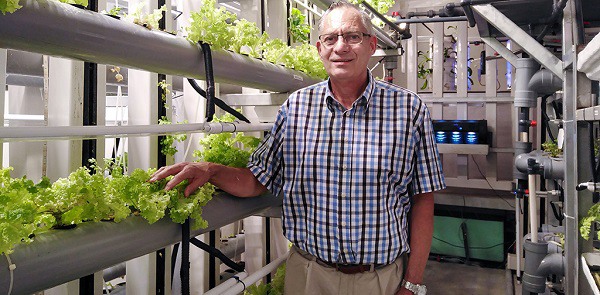Bart Wehman is passionate about introducing products and technologies that can make a difference. He is a true business development manager. In a nutshell, his experience ranges from “seed, to ready-to-eat”. It includes all facets of the horticultural supply chain. For almost a decade Bart has resided and worked in the United Arab Emirates (UAE).
 Bart visiting Merlin Aquaponic Farms Sharjah
Bart visiting Merlin Aquaponic Farms Sharjah
“My horticultural work experience began in Bulgaria and France. Further down the line, I worked in seed breeding companies for almost six years. In 1990, Peter Kooijman and I founded Pebaco. Pebaco exports greenhouses and storage technology to the former Eastern European countries. Later I worked for the companies Eillert, FTNON (food processing) and JASA (packaging). For Eillert I travelled 7 years worldwide selling vegetable processing projects. During these years, I made many business contacts, one being Fanar Al Khaleej. This company offered me a position in 2011," Bart said.
Bart is Senior Manager at Fanar Al Khaleej. Fanar is active in the food industry for more than 30 years. The company focuses on industrial refrigeration, food ingredients, and food processing machinery. Fanar Al Khaleej’s is mainly active in the GCC countries (Saudi Arabia, Kuwait, Bahrain, United Arab Emirates, Qatar, Oman).
Bart is responsible for meat/fish processing projects. As Senior Manager he also supports his colleagues in the Fruits/Vegetables/Dairy and Snacks business units. Their customers are companies that produce for the local and export market.
"My current focus is on turn-key projects. These are in meat/fish processing, meat successors (plant-based or others) and fast-food/catering. Restaurants/fast-food chains are increasingly producing their food in central kitchens. We’re responding to that. New developments like meat/dairy successors, items that are very popular in the Netherlands, are giving new challenges for this market. I am pleased to contribute to these innovative, sustainable, healthy developments," Bart explains.
Bart lives in Ajman, one of the UAE’s seven emirates. The Emirates has a desert climate. From October to April, the weather is warm and pleasant, swimming and barbecuing are the main activities in this period. "During the summer from May to September it’s too hot outside to indulge in outside activities. Then I head to the cinema or visit a shopping mall."
“As of 2018 VAT has been introduced here, but prices are still lower than in the Netherlands despite the five percent rate. Many people from low-wage countries work here, so more services are offered. You will be served at the gas station. Also hairdresser and tailors are inexpensive," says Bart. "If you buy large items such as a TV, bed, wardrobe, or refrigerator, it will be delivered, assembled, and fully connected. You can’t drink the tap water everywhere. So, it usually comes in bottles. Household gas usually comes in bottles too. The traffic however is a quite busy and chaotic."
Dubai is a city worth visiting. The best time is October till May. "There are many entertainment venues and activities. These include for example the Miracle Garden, The Frame, Burj Khalifa, Zoo in Al Ain, dessert safari and beautiful mountains etc. In October 2021, the EXPO 2020 will open. It showcases state-of-the-art technology and products with the focus on sustainability. Definitely worth a visit," Bart adds.
On his visits to the Netherlands, Bart appreciates the choice when it comes to food. These are not only tasty sandwiches, herring, gingerbread, and salty liquorice. There are many ready-made products too. And he enjoys the meat and vegetables quality and diversity.
"In the Netherlands, many things are also well regulated, like traffic and healthcare. In the UAE, you have to call the insurance company for permission for every treatment or medicine. It always remains a challenge, but I’ve now found my way here."
“I have a strong affinity with the fruit and vegetable sector and this will remain so. It’s an innovative, dynamic industry. All the GCC countries want to become strategically self-sufficient," the Senior Manager says. "That means considerable challenges remain in the area of sustainable local fruit and vegetables production. For example, indoor farming and cooled greenhouse cultivation, but also post-harvest, such as local storage (ULO).
“Taking in consideration the actual carbon food print caused by food production, I’m ready to use my years of experience in food processing to contribute to a sustainable and healthier food production in the Middle East," Bart concludes.
Bart Wehman
BartWehman@outlook.com
LinkedIn Bart Wehman
T: +971 50 3675791
